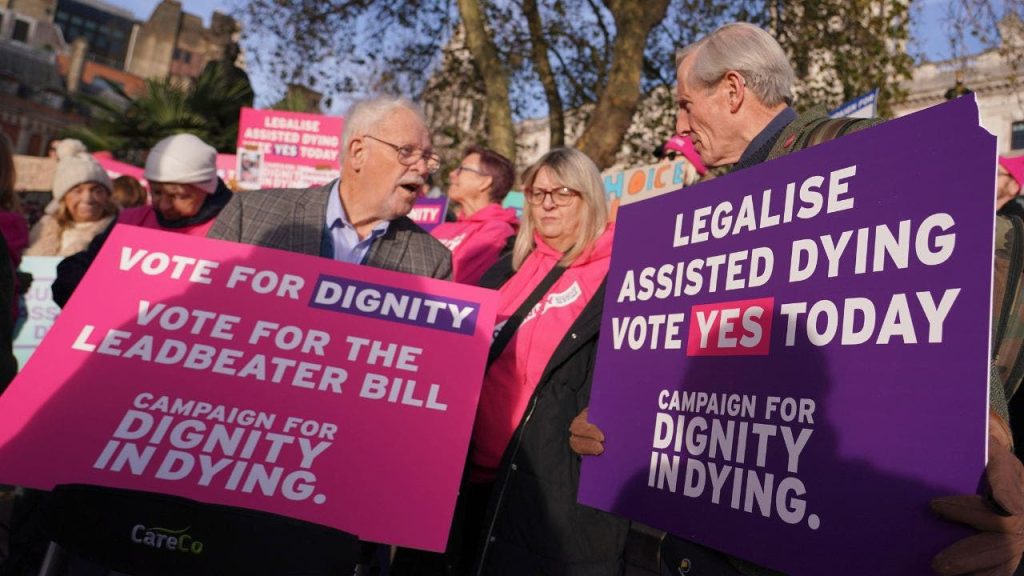The recent vote in the House of Commons signifies a pivotal moment in the ongoing debate surrounding assisted dying in England and Wales. With lawmakers approving a bill that allows terminally ill adults, aged 18 and above, to request assistance in ending their lives, the discussion has transformed from mere advocacy to a tangible legislative process, with a vote of 330 to 275. This legislative movement, which now awaits further scrutiny and a final vote in Parliament, is underscored by complex emotions and societal considerations, as personal stories of suffering and grief were shared during the debates. These testimonies have illuminated the profound challenges faced by many terminally ill individuals, challenging lawmakers and the public to confront the ethical ramifications of assisted dying.
Supporters of the bill argue that it seeks to provide terminally ill patients with dignity and autonomy in the face of unbearable suffering. Advocates assert that granting individuals the choice to end their lives under specific circumstances can alleviate pain and distress, safeguarding their dignity in their final moments. Furthermore, they emphasize the importance of strict safeguards to prevent coercion, asserting that individuals would only be permitted to proceed with the assistance of two doctors and a High Court judge, ensuring that the decision was both voluntary and well-considered. However, opponents raise significant concerns regarding the potential risks involved, particularly regarding vulnerable populations who may feel pressured to choose assisted dying inorder to avoid becoming a burden on their families or the healthcare system.
The broader context reveals a surge in public support for assisted dying legislation across various countries and regions. Several European nations, including Belgium, Luxembourg, and Germany, have already passed laws decriminalizing euthanasia or assisted dying. Similarly, ten U.S. states have enacted legislation permitting the practice, showcasing a growing acceptance of the idea that individuals should have the right to determine the circumstances of their own deaths. Despite these developments, skeptics in the U.K. remain vigilant, cautioning against unintended consequences and the potential for slippery slopes in policy. The call for extensive safeguards reflects a desire to balance compassionate care for the dying with the ethical responsibilities of lawmakers to protect vulnerable individuals from exploitation.
In the wake of the vote, the bill’s main sponsor, Kim Leadbeater, expressed her commitment to thoroughly scrutinizing the legislation further. She aims to gather both written and oral evidence to bolster the bill’s framework, ensuring it adequately addresses the many nuances of assisted dying. Leadbeater emphasized that the process of refining the legislation will take time, allowing stakeholders the opportunity to voice their concerns and ideas. This commitment to a comprehensive review reflects an understanding of the weighty implications associated with assisted dying policies, a recognition shared by many in Parliament, regardless of their voting position.
Amidst this unfolding narrative, diverging perspectives within the political arena illustrate the deeply personal nature of the assisted dying debate. Key figures in the government have expressed openly differing views, reflecting a national climate of varied emotional investment. Prime Minister Sir Keir Starmer celebrated the bill’s progression while allowing his party members to vote freely, underscoring a clear division in personal beliefs among lawmakers. The juxtaposition of compassion and caution portrayed by figures such as Conservative lawmaker Danny Kruger, who fears loopholes in the bill, underscores the complexity of the issues at hand and the dual responsibility of legislative bodies to care for both patients’ autonomy and societal protections.
As discussions advance, critical assessments regarding funding, implementation, and the potential impacts on the National Health Service (NHS) and hospice care systems loom large. This multifaceted evaluation underscores the intricate interplay of moral, ethical, and practical considerations that must be addressed to navigate the proposal responsibly. With significant implications for future healthcare practices and the dignity of dying individuals, the bill reflects a broader societal confrontation over the rights of terminally ill patients versus safeguarding vulnerable communities. As the discourse continues, the focus remains not only on the legislative process but also on fostering a compassionate dialogue that respects diverse opinions while addressing the urgency and complexity of the assisted dying conversation.










